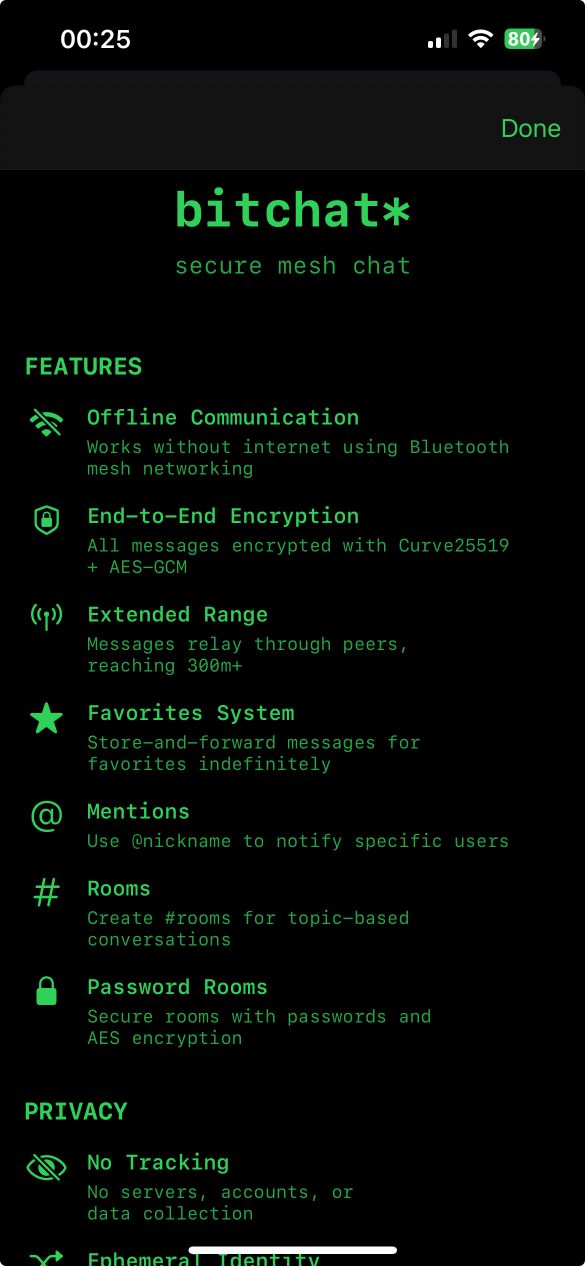Jack Dorsey’s new app BitChat lets you send bitcoin without the internet… Sort of

How Bitchat uses Bluetooth mesh to move Bitcoin—no Wi-Fi or SIM card required
Two weeks ago, we wrote about a curious little app quietly launched by Jack Dorsey’s TBD team called Bitchat, a decentralized peer-to-peer messaging tool that runs entirely over Bluetooth mesh, with no internet required.
Unlike traditional messaging apps, Bitchat lets you send messages to people nearby without Wi-Fi, cell service, or internet access. No phone numbers. No email. No centralized servers. Messages move directly from one device to another via local Bluetooth connections, allowing people to stay connected even when the rest of the network goes dark.
Fast forward eleven days after launch, and BitChat has taken the internet by storm and many on social media are now claiming it lets you “send Bitcoin without the internet.”
Bitchat, the new experimental app from Dorsey’s team at TBD (a subsidiary of Block), isn’t quite rewriting the laws of physics. You won’t beam Bitcoin across continents from a cave with zero signal. But what it does offer is just as intriguing: a way to send Bitcoin or encrypted messages using only Bluetooth—no internet connection, SIM card, or cell tower in sight.
How is that even possible? And what’s the catch? In this article, we’ll break down exactly how it works, where it shines, and why it might matter more than you think.
How Bitchat Actually Works
At first glance, Bitchat looks like just another minimalist chat app. But under the hood, it’s quietly doing something pretty radical: passing messages and Bitcoin transactions across devices without touching the internet. It does this through something called a Bluetooth mesh network, and here’s what that means in plain English.
1. Bluetooth Mesh Networking
Instead of sending data directly over the internet or via SMS, Bitchat uses Bluetooth Low Energy (BLE) to communicate. Each phone running the app acts like a tiny radio tower, broadcasting short-range signals to other nearby devices. These phones form a mesh network, where messages and transactions are passed from device to device, like a digital game of telephone.
-
Imagine you send a message or a Bitcoin transaction in a crowd.
-
Your phone hands it off to the next Bitchat user within Bluetooth range (typically ~30 meters, but up to ~300 meters in open space).
-
That user’s phone stores the data and keeps passing it along until it reaches the intended recipient, or anyone who eventually connects to the internet.
This means the app doesn’t rely on any servers, Wi-Fi routers, or mobile data plans. It turns people’s devices into a decentralized, walking internet.
2. Encrypted and Anonymous by Design
Bitchat is built with privacy in mind. Messages and transactions are end-to-end encrypted using Curve25519 key exchange and AES-GCM encryption, which means even the devices relaying your data can’t read what’s inside.
On top of that, Bitchat doesn’t require a phone number, email, or username. Every user gets a random, ephemeral identity, making the app resistant to tracking or surveillance. It even has a Panic Mode that instantly wipes all your local data if you feel your privacy is at risk.
3. No Internet, But Still Smart
The real magic of Bitchat isn’t just Bluetooth—it’s how it uses store-and-forward logic. If your message or Bitcoin transaction doesn’t reach its destination immediately, other phones will store it temporarily and keep forwarding it when new peers show up nearby.
And here’s the kicker: Bitchat can cache messages for up to 24 hours while searching for a viable route. If a user comes online during that window, they’ll broadcast your transaction to the Bitcoin network for you.
It’s not instant. It’s not guaranteed. But it’s clever—and in the right circumstances, it works.

How Bitcoin Without Internet Works… Sort Of
The big headline claim is that Bitchat lets you send Bitcoin without an internet connection. And technically, that’s true—but only if you understand what’s really happening behind the scenes.
Let’s break it down.
Step 1: You Create and Sign a Transaction Offline
When you “send Bitcoin” through Bitchat, you’re not actually broadcasting it to the blockchain yourself. What you’re doing is generating and cryptographically signing a Bitcoin transaction offline. It’s like writing and signing a check—you’ve authorized the payment, but it hasn’t been delivered to the bank yet.
Bitchat doesn’t host your Bitcoin wallet. You’ll still need a separate wallet app that supports Partially Signed Bitcoin Transactions (PSBTs) or raw transaction generation. Once signed, that transaction can be handed off to Bitchat for delivery.
Step 2: The Transaction Hops Over Bluetooth
Instead of sending your transaction to the Bitcoin network over Wi-Fi or cellular data, Bitchat passes it through its Bluetooth mesh. That signed transaction is now floating through the air, device to device, like a digital carrier pigeon.
Each phone running Bitchat stores and forwards the transaction to others in range. No one sees the contents, thanks to encryption—it’s just raw data moving through the mesh.
Step 3: Someone Else’s Phone Uploads It to the Blockchain
Eventually, one of those phones in the mesh connects to the internet. Maybe they walk into a building with Wi-Fi, or switch their data back on. Once that happens, Bitchat broadcasts your signed transaction to the Bitcoin network.
Only then does the actual transfer of funds occur. Miners verify the transaction, and it gets added to the blockchain. The recipient sees it confirmed, and you never had to go online.
So, Is It Really “Without Internet”?
Sort of.
You didn’t need an internet connection.
But someone else’s phone eventually did.
The genius of Bitchat isn’t that it removes the internet entirely—it’s that it outsources the upload step to anyone else in the mesh. This makes Bitcoin payments possible in places with no service, active censorship, or even in total blackouts.
It’s not magical. It’s not instant. But it’s a fascinating workaround—and in some contexts, it could be a lifeline.
Below is a video of an X user, Vivek, using Bitchat to send Bitcoin without an internet connection.
🇺🇸 BILLIONAIRE JACK DORSEY JUST LAUNCHED AN APP WHERE USERS CAN SEND #BITCOIN WITHOUT INTERNET
THIS IS MASSIVE!!! pic.twitter.com/SnOQqqjKn0
— Vivek⚡️ (@Vivek4real_) July 17, 2025
Pros & Real-World Scenarios
While Bitchat might seem like a novelty to some, it’s not just a cool tech demo. This app solves real problems in real-world situations where traditional internet access either doesn’t exist or can’t be trusted.
Here are a few scenarios where Bitchat’s offline-first model could make a serious difference:
1. Internet Shutdowns and Censorship Zones
In countries where governments shut down the internet during protests or elections, tools like Bitchat could be a digital lifeline. People could still pass messages, coordinate, or even send Bitcoin without relying on centralized infrastructure.
And because Bitchat doesn’t require SIM cards, phone numbers, or email addresses, it’s far harder to track. Messages move quietly through peer-to-peer Bluetooth hops, outside the reach of most surveillance systems.
2. Disaster Zones or War Areas
In the aftermath of earthquakes, hurricanes, or armed conflict, communications infrastructure is often one of the first things to fail. Bitchat gives people a way to keep sending messages or transferring money, even when cell towers are down or power is out.
It’s not a perfect replacement for internet access, but when every minute counts, even limited communication can be life-saving.
3. Large Events or Remote Communities
Think music festivals, remote villages, or dense crowds with poor cell coverage. Bitchat can enable people to chat, share info, or even tip performers in Bitcoin—completely offline.
The more users in an area, the better the mesh network works. In fact, densely packed events are where Bitchat is likely to shine the most.
4. Censorship-Resistant Payments
Let’s say your government blocks Bitcoin or your bank freezes your account. With Bitchat, you can still generate a transaction, pass it offline to someone else, and let them upload it later when they’re outside the censorship zone.
That’s a major win for freedom of expression and financial independence—something Jack Dorsey has been vocal about supporting.
It’s Not for Everyone. But for Some, It’s Everything.
Sure, if you’re sitting at home with a stable Wi-Fi connection, Bitchat might feel like a tech toy. But if you’re on the frontlines of political upheaval, living off-grid, or simply preparing for the unexpected, it could be a vital tool.
In a world increasingly dependent on centralized platforms, Bitchat flips the model: no servers, no logins, no middlemen.
BitChat Limits & Caveats
As exciting as Bitchat sounds, it’s not without serious limitations—and it’s important to understand what it can’t do before hailing it as the future of offline finance.
Let’s unpack the most important caveats.
1. It’s Not Instant — At All
While traditional Bitcoin transactions can settle in about 10 minutes (or seconds on the Lightning Network), Bitchat transactions can take hours—or even days—to broadcast. Why? Because your signed transaction must physically hop through other people’s phones until one of them finally connects to the internet.
If no one around you has Bitchat installed—or if no one connects to the internet soon—your transaction just sits there.
In other words, you’re not in control of when it gets submitted.
2. It Needs a Dense User Base to Work Well
Bluetooth mesh networks are only as strong as the number of people around you using the app. In a packed stadium or protest, the mesh could thrive. But in a small town or remote area where you’re the only Bitchat user? It won’t do much.
The app is currently in beta with a 10,000-user cap on iOS, and Android users have to sideload the app. That makes the network pretty thin, especially outside of tech-savvy circles.
3. Security Risks Still Exist
While Bitchat uses modern encryption (Curve25519 and AES-GCM), the protocol has not yet undergone third-party security audits. In fact, the whitepaper itself acknowledges potential vulnerabilities, including the risk of impersonation within the mesh.
Also, because it’s an experimental system, you’re trusting a relatively new app with your signed Bitcoin transactions. That might be a tough sell for people who are used to hardened, long-established wallets.
4. It Can Drain the Battery Quickly
Bluetooth-based mesh networks require devices to scan and advertise signals frequently. This can lead to faster battery drain, especially if your phone is constantly relaying messages for others.
In emergency or low-power situations, that tradeoff could be a dealbreaker.
5. It’s Not a Wallet — You Still Need One
Bitchat doesn’t hold or manage your Bitcoin. You’ll still need a separate wallet app to create and sign transactions. For non-technical users, this extra step could make the process feel clunky and inaccessible.
It’s more like a transport system than a financial app.
So… Should You Use It?
If you’re curious, privacy-focused, or living in a place where digital freedom is at risk, Bitchat is worth exploring. But if you’re just trying to send Bitcoin to a friend at Starbucks, it’s probably overkill.
This is not a Venmo replacement. It’s an experiment—but one that hints at something powerful: a future where even money can flow without the internet.
Tech & Development Background
Believe it or not, Bitchat wasn’t the product of a massive, multi-year development roadmap. It started as a side project—and a bold experiment in what’s now being called “vibe coding.”
Jack Dorsey’s company, Block, has a division called TBD, which focuses on open-source, decentralized technologies. The initial prototype of Bitchat was reportedly built in just a few days during a hackathon weekend, using Block’s in-house AI pair programmer called Goose. (Yes, like from Top Gun.)
The goal? To explore what decentralized communication could look like in a world where people can’t always count on traditional infrastructure. According to the team, they were inspired by:
-
Mesh networking pioneers like Briar and Bridgefy
-
The rise of censorship-resistant tools
-
The increasing need for offline communication in disaster zones and authoritarian regimes
Bitchat was first released via Apple’s TestFlight platform, where it quickly reached its 10,000-user beta cap. Android support is available via sideloading from the official GitHub repo, but no public app store release has been announced—yet.
Block and TBD have made it clear that Bitchat is open-source and experimental. It’s not being marketed as a finished product, but rather a foundation for developers and freedom-tech advocates to build upon.
And based on the buzz it’s generated, it’s clear they’ve tapped into something people care about.
Conclusion + What to Watch
Jack Dorsey’s Bitchat isn’t just a quirky tech experiment. It’s a bold statement: that communication and currency shouldn’t be limited by your access to the internet, or by the institutions that control it.
By turning Bluetooth into a decentralized relay system, Bitchat allows users to pass encrypted messages and Bitcoin transactions without relying on centralized servers, phone numbers, or even active data connections. In an increasingly connected world, it dares to explore what happens when everything goes disconnected—by choice or by force.
But let’s be clear: this isn’t a polished product for the masses. It’s not going to replace your mobile wallet or Telegram anytime soon. Its user base is limited, its security untested at scale, and its performance depends heavily on how many people are around you using the app. If the network is too sparse, the magic fizzles out.
That said, Bitchat is a glimpse into the future—one where your phone can participate in a silent, peer-to-peer network that can survive censorship, outages, and even total blackouts.
What to Watch Next
-
Will Bitchat undergo independent security audits?
-
Will the mesh expand beyond Bluetooth to Wi-Fi Direct or other radio protocols?
-
Will it integrate more directly with Bitcoin wallets—or even with Lightning?
-
And will governments take notice of a tool that sidesteps their digital gatekeeping?
Whatever happens, one thing’s clear: “offline” is no longer a dead zone. It’s becoming a playground for innovation.
And Bitchat just kicked the door open.




